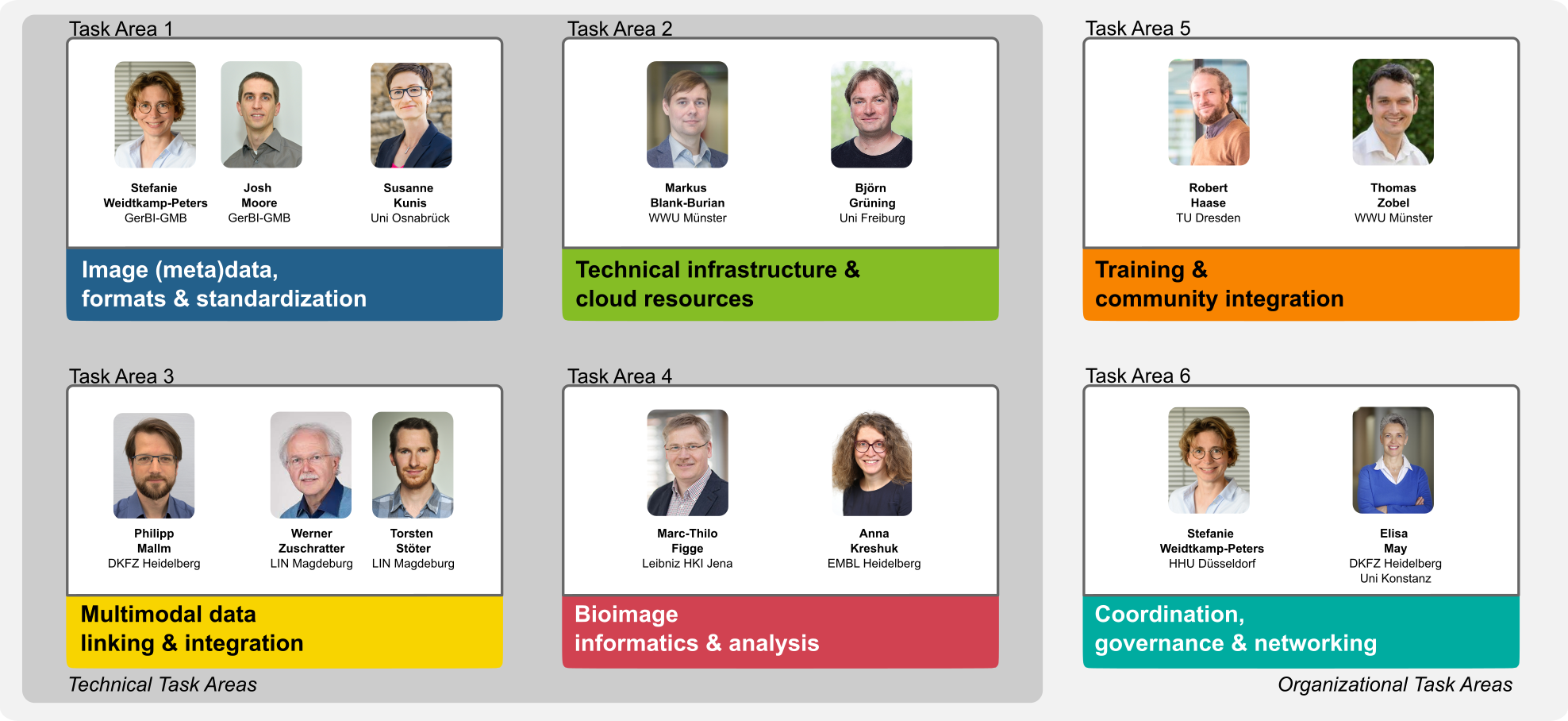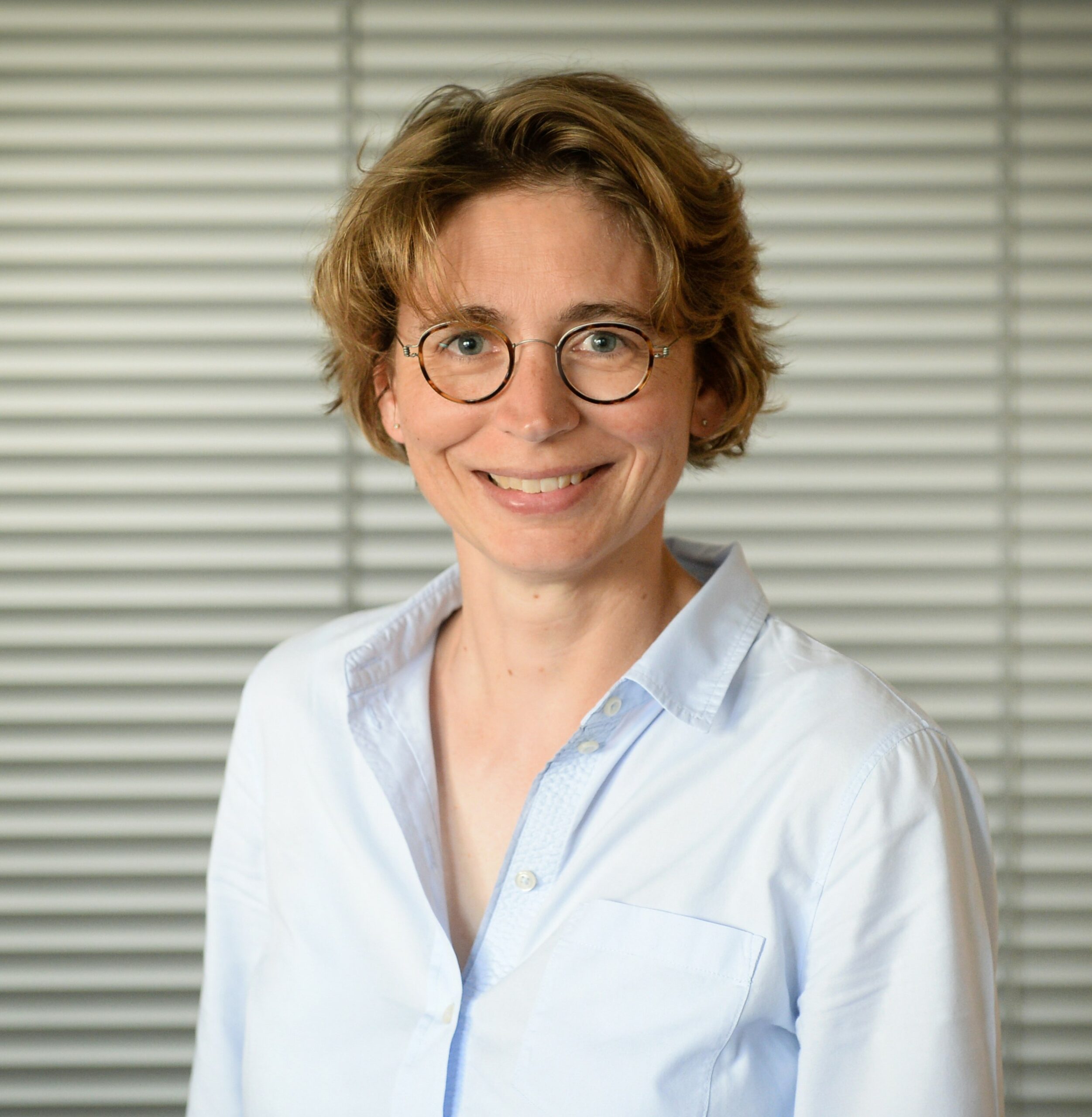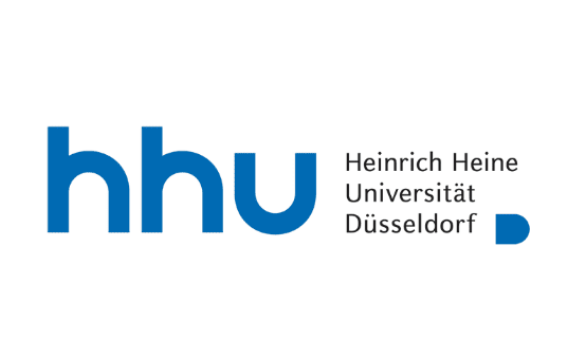
About us
NFDI4BIOIMAGE intends to establish and further develop data management for bioimaging and bioimage analysis for researchers in Germany and in coordinated collaboration with international partners. The consortium is composed of experts in (light) microscopy and image analysis (bioimage informatics). Several co-spokespersons lead microscopy centers or multimodal instrument centers and are networked through the non-profit association German BioImaging – Society for Microscopy and Image Analysis e.V. where they are jointly active for the interests of the microscopy community. In addition, the co-spokespersons and stakeholders are internationally recognized for their professional contributions in the field of image analysis, microscopy methods, or data management concepts and systems.
With numerous contributions from the scientific community across disciplines, NFDI4BIOIMAGE, as a primarily method-centric consortium, addresses the particular challenges associated with the large volume, high-dimensional image data generated by modern microscopy. Goals include the development of a cloud-compatible FAIR digital object standard for biological imaging, the further development of metadata standards and annotation tools, the linkage between local storage solutions and appropriate microscopy data repositories, as well as the improved reproducibility of image analysis workflows and the dissemination of best practices in the scientific community.
Goals
- Facilitate the standardization of image data formats for bioimaging
- Establish a FAIR Digital Object Standard with Next-Generation File Formats for cloud-based bioimage data handling
- Improve metadata standards and annotation tools
- Facilitate better reproducibility of bioimage informatics workflows
- Improve the interoperability of common image analysis tools for the full provenance of analysis workflows
- Multimodal data integration of bioimaging data with data from multiple other scientific methods and disciplines
- Capacitate the scientific community with knowledge and competence for bioimaging research data management
- International networking and visibility of the National Research Data Infrastructure within the international microscopy community.
Task Areas
NFDI4BIOIMAGE is organized into six Task Areas. At least two co-spokespersons are jointly responsible for a Task Area.


Prof. Dr. Stefanie Weidtkamp-Peters
Speaker of the consortium
(Co-)applicant institutions and (co-)speakers:
(Co-)Speakers:
- Prof. Dr. Elisa May, German Cancer Research Center, Heidelberg & University of Konstanz
- Dr. Jan-Philipp Mallm, German Cancer Research Center, Heidelberg
- Joshua Moore, executive co-spokesperson with S. Weidtkamp-Peters, Society for Microscopy and Image Analysis (GerBI-GMB)
- Dr. Susanne Kunis, University of Osnabrück
- Dr. Werner Zuschratter, Leibniz-Institute for Neurobiology, Magdeburg
- Torsten Stöter, executive co-spokesperson with W. Zuschratter, Leibniz-Institute for Neurobiology, Magdeburg
- Dr. Björn Grüning, Universität of Freiburg
- Dr. Markus-Blank-Burian, University of Münster
- Dr. Thomas Zobel, University of Münster
- Dr. Anna Kreshuk, European Molecular Biology Laboratory
- Prof. Dr. Marc-Thilo Figge, Leibniz-Institute for Natural Product Research and Infection Biology, Hans Knöll Institute
- Dr. Robert Haase, Technical University of Dresden
(Co)-applicant institutions:
- Heinrich-Heine University Düsseldorf
- University of Freiburg
- European Molecular Biology Laboratory
- German BioImaging – Society for Microscopy and Image Analysis
- German Cancer Research Center
- Leibniz Institute for Natural Product Research and Infection Biology, Hans Knöll Institute
- Leibniz Institute for Neurobiology
- Technical University Dresden
- University of Konstanz
- University of Münster
- University of Osnabrück

Heinrich-Heine-University Düsseldorf (HHU)
Applicant institution
Participating Institutions
- Forschungszentrum Jülich
- Georg-August-University of Göttingen
- Helmholtz-Center for Environmental Research
- Johannes-Gutenberg University Mainz
- Leibniz Institute of Photonic Technology
- Leibniz Institute for Analytical Sciences
- Leibniz Institute for Plasma Science and Technology
- Max Planck Institute for Evolutionary Biology
- University Heidelberg
- University of Applied Sciences and Arts Göttingen
- University of Cologne
- Jean-Marie Burel, University of Dundee, UK

Prof. Dr. Stefanie Weidtkamp-Peters
Speaker of the consortium

Heinrich-Heine-University Düsseldorf (HHU)
Applicant institution
(Co-)applicant institutions and (co-)speakers:
(Co-)Speakers:
- Prof. Dr. Elisa May, German Cancer Research Center, Heidelberg & University of Konstanz
- Dr. Jan-Philipp Mallm, German Cancer Research Center, Heidelberg
- Joshua Moore, executive co-spokesperson with S. Weidtkamp-Peters, Society for Microscopy and Image Analysis (GerBI-GMB)
- Dr. Susanne Kunis, University of Osnabrück
- Dr. Werner Zuschratter, Leibniz-Institute for Neurobiology, Magdeburg
- Torsten Stöter, executive co-spokesperson with W. Zuschratter, Leibniz-Institute for Neurobiology, Magdeburg
- Dr. Björn Grüning, Universität of Freiburg
- Dr. Markus-Blank-Burian, University of Münster
- Dr. Thomas Zobel, University of Münster
- Dr. Anna Kreshuk, European Molecular Biology Laboratory
- Prof. Dr. Marc-Thilo Figge, Leibniz-Institute for Natural Product Research and Infection Biology, Hans Knöll Institute
- Dr. Robert Haase, Technical University of Dresden
(Co)-applicant institutions:
- Heinrich-Heine University Düsseldorf
- University of Freiburg
- European Molecular Biology Laboratory
- German BioImaging – Society for Microscopy and Image Analysis
- German Cancer Research Center
- Leibniz Institute for Natural Product Research and Infection Biology, Hans Knöll Institute
- Leibniz Institute for Neurobiology
- Technical University Dresden
- University of Konstanz
- University of Münster
- University of Osnabrück
Participating Institutions
- Forschungszentrum Jülich
- Georg-August-University of Göttingen
- Helmholtz-Center for Environmental Research
- Johannes-Gutenberg University Mainz
- Leibniz Institute of Photonic Technology
- Leibniz Institute for Analytical Sciences
- Leibniz Institute for Plasma Science and Technology
- Max Planck Institute for Evolutionary Biology
- University Heidelberg
- University of Applied Sciences and Arts Göttingen
- University of Cologne
- Jean-Marie Burel, University of Dundee, UK